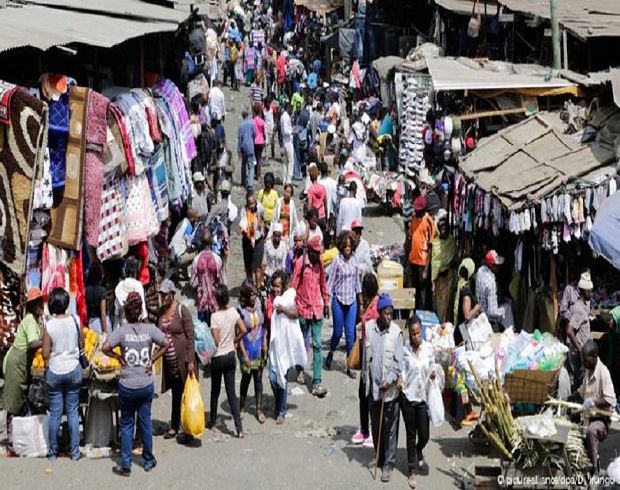Gikomba on Steroids

Lying due east of Nairobi’s central business district is the vibrant Gikomba market, fondly referred to by Nairobi’s urban youth as G-Mall. On Google maps it is an amorphously shaped region with a distinct southern boundary buttressed by the Nairobi River that weaves sluggishly past what is described as East Africa’s largest open air market. Google also provides interesting insights about this marketplace. Peak shopping times are from 11 am to 3 pm and people spend between 45 minutes to two hours there. An old friend and unrelenting champion for Kenyan small and medium sized entrepreneurs invited me to join her for a visit to Gikomba last week. The last time I had visited Gikomba was when I was a student at University of Nairobi, and we would go there to shop for second hand clothes.
Not much has changed in the last 20 years. Gikomba is a kaleidoscope of smells, textures, indoor and outdoor retail experiences and thousands of people jostling for space. Traders have self-organized themselves into the raw material section for wood, upholstery for furniture, finished furnishings, fish and vegetables, clothing, hardware, you name it, they’ve got it. Sort of like a Nakumatt on raw but incredible steroids. Our first pit stop was at the timber section. To get there we had to weave through a narrow alleyway in between buildings, dodging men carrying plywood sheets on their shoulders as they hissed to clear the pathway ahead of them.
There were lots of young men who seemingly idled to the side, but who I later came to discover are a key cog in the selling protocol of the timber section. These young men are brokers who “bring” customers to the timber traders and are rewarded Kshs 3/- per foot of timber that is sold to the converted customers. I asked one of the traders where they were sourcing wood from in light of the logging ban. He shrugged his shoulders and said Malawi, Congo and South Sudan. Business, just like nature, abhors a vacuum.
It had rained the night before, so we gingerly made our way through the muddy paths in between the timber sheds as bits of flying wood chips from lathing and planing machines filled the air and our faces. Every inch of space is covered by exposed towers of timber or upholstery sponge stocks. I’m told that the exposure to rain makes the sponges get wet and moldy and, since they are eventually covered by upholstery, buyers of furniture would never know that their couches contain potentially harmful agents. When family members are perpetually sick it is difficult to pinpoint that the problematic source actually stems from the furniture.
Eventually we got to a group of timber selling sheds that are on a sliver of land between commercial buildings and the Nairobi River. There is space wide enough for a single motor vehicle to slither through as the mud roads are slick with the previous night’s precipitation. Njuguna is the seasoned trader who blandly answers our questions about the area, as my colleague purchases wood. He points to the building under construction directly opposite us. “That is the result of the last fire that happened in Gikomba. The shops downstairs caught fire and the people in the flats above died from the toxic fumes that resulted as the stocks burnt. Those people were not burnt to death. They died from smoke inhalation.” It is easy to see why fire engines could never and will never get through to stave off fire emergencies. There are simply no paved roads. He points to the next building where the third and fourth floor are blackened with soot and covered with mabati sheets. The lower floors are still occupied. “That is where we buy electricity for our machines.”
Njuguna has a machine “ ya kupiga randa” which in plain English is for smoothening the timber planks using an electric plane. He pays Kshs 500/- daily to the building owner who has installed a genuine electricity meter in Njuguna’s shed to measure the daily usage. This scene is replicated down the entire street. Building owners who double up as electricity distributors because business, just like nature, abhors a vacuum.
The pulsating business environment that is Gikomba market is a cash economy that turns over hundreds of millions of shillings daily. Business thrives in spite of lack of infrastructural support such as roads, public toilets or permanent sheds to cover traders and their wares as well as. You cannot refer to SMEs in Kenya without picturing a Gikomba trader whose resilience and determination to thrive under incredibly difficult circumstances is unfathomable. Next week I will cover our tour of the fish market and “Kachonga” the home of Nairobi’s wood sculptors.
Twitter: @carolmusyoka

 carolmusyoka consultancy
carolmusyoka consultancy
 @carolmusyoka
@carolmusyoka